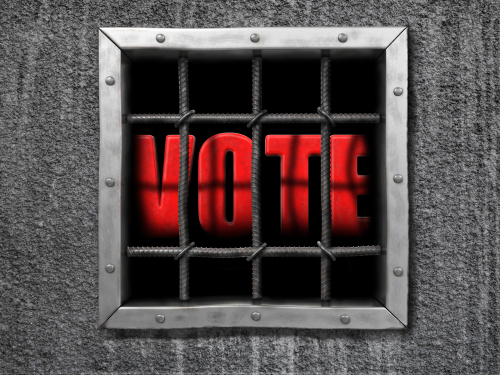En banc court rules Florida can require felons to pay fines before voting; 5 Trump appointees join majority

Image from Shutterstock.com.
An en banc federal appeals court has ruled that Florida did not violate the Constitution by requiring felons to pay fines, fees, costs and restitution before they are able to vote.
The full 11th U.S. Circuit Court of Appeals at Atlanta ruled Friday. The decision blocks hundreds of thousands of Florida residents from registering to vote in time for the November 2020 election, according to a Sept. 11 press release by the American Civil Liberties Union.
Chief Judge William Pryor—a judge who has appeared on President Donald Trump’s U.S. Supreme Court short list—wrote the majority opinion. He was joined in full or mostly by five other judges, all of whom are Trump appointees: Kevin Christopher Newsom, Elizabeth Branch, Britt Grant, Robert Luck and Barbara Lagoa. There were four dissenters.
The majority reversed a May decision by U.S. District Judge Robert Hinkle of the Northern District of Florida. The Tallahassee federal judge had found that the fees and fines requirement violates the equal protection rights of those unable to pay and amounts to an unconstitutional poll tax if the fees and fines are used to fund the criminal justice system.
The Florida legislature had imposed the fines and fees requirement after Florida voters passed Amendment 4, a 2018 state constitutional amendment that restored voting rights to many felons “upon completion of all terms of sentence including parole or probation.” Felons convicted of murder or felony sexual offenses were not eligible for restoration of voting rights.
In an advisory opinion in January, the Florida Supreme Court interpreted the phrase “all terms of sentence” to require payment of fees and costs before voting.
In the en banc opinion, the 11th Circuit found that there was no violation of the 14th Amendment’s equal protection clause and due process clause, no poll tax in violation of the 24th Amendment, and no vagueness problem stemming from laws that penalize disqualified people who vote.
The Supreme Court has held that the 14th Amendment expressly allows states to bar criminals from voting, the appeals court said. Florida has a “legitimate interest in restoring to the electorate only fully rehabilitated felons who have satisfied the demands of justice,” the majority said.
The court said laws penalizing those who vote, despite being ineligible, are not vague because they include a scienter requirement. In other words, the laws ban a felon from voting only “if he knows that he has failed to complete all terms of his criminal sentence.”
“No felon who honestly believes he has completed the terms of his sentence commits a crime by registering and voting,” the appeals court said.
Pryor also wrote a concurrence to his own majority opinion, which was joined by Lagoa.
“Our dissenting colleagues predict that our decision will not be ‘viewed as kindly by history’ as the voting-rights decisions of our heroic predecessors,” Pryor wrote. “But the ‘heroism’ that the Constitution demands of judges—modeled so well by our predecessors—is that of ‘devotion to the rule of law and basic morality.’ … Our duty is not to reach the outcomes we think will please whoever comes to sit on the court of human history.”
Law360 and the Washington Post had coverage of the opinion, Jones v. DeSantis.
Write a letter to the editor, share a story tip or update, or report an error.


